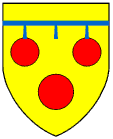
LIVES OF THE BISHOPS OF EXETER
PETER COURTENAY was the son, not the second, according to Hoker, but perhaps the sixth, of Sir Philip Courtenay, of Powderham, knight, by his wife Elizabeth, daughter of the gallant Walter Lord Hungerford, Knight of the Garter. After pursuing his studies with credit at Oxford, he proceeded to Patina, then regarded as the principal seat of learning in Europe, and there obtained the degree of Doctor of Canon and Civil Law. Ecclesiastical preferments courted him on his return. On 30th May, 1453, he was admitted to the family benefice of Moreton Hampstead. Nine days later he was collated to the archdeaconry of Exeter, which he exchanged on 7th January, 1475, with Robert Ayscough, for the canonry and prebend of Charminster and Beer Regis, then annexed to the church of Sarum. On 7th October, 1464, he was also collated to the archdeaconry of Wilts. In the course of 1474 King Edward IV. appointed him his secretary. On 11th October, 1476, was installed Dean of Windsor, and was also appointed master of St. Anthony's free chapel and hospital, London, which King Edward IV. had just appropriated to the Royal Collegiate Church of Windsor. On 27th April, 1477, was promoted to the deanery of Exeter, and on 4th December the same year presented to the valuable living of Menhenniot in Cornwall. Pope Sixtus IV. provided him on 5th September, 1478, to the vacant see of Exeter; and he is the first instance of its dean mounting to its pontifical chair. King Edward IV. restored to him the temporalities on 3rd November that year, and on Sunday 8th November, 1478, he was consecrated in the Royal Chapel of St. Stephen's, Westminster, by Thomas Kempe Bishop of London. His imperfect register acquaints us with his residing at Bishop's Clist early in the ensuing spring, where he held an ordination on 7th and on 27th March, and on 18th December, 1479, and again there on 18th March and 27th May, 1480. It appears that he left the diocese in September that year: we cannot ascertain the precise period of his return; but we find him at Bishop's Clist on 3rd March, 1482, when he instituted Dr. Richard Mayow to the vicarage of Branscombe, and in the summer of that year he was in Cornwall, where he dedicated St. Agnes' Chapel with its cemetery. We meet him in Exeter on 1st October, 1482, and we suspect that he was here on 18th October, 1483, when Henry Earl of Richmond (afterwards King Henry VII.) was proclaimed the rightful sovereign. It may be thought strange that he should assist at the splendid coronation of Richard III. at Westminster, on 6th July, 1483; for he knew how the usurper had been prevented from gaining possession of Ann Duchess of Exeter, a great heiress and his niece, through his cautious policy, and therefore he was marked out for vengeance by this usurper. Perhaps he could not, with safety to himself, decline being officially present; but he made his escape to Bretagne early in November. He had hardly done so, when the tyrant arrived to occupy his palace, which be found abundantly stored with provisions. In the sequel Courtenay made himself instrumental in establishing Henry on the throne of England, who, in gratitude for his services, had him translated to the see of Winchester. There he died, according to some accounts on 20th December, 1491, but this must be incorrect, for he authorised his suffragan, Richard Bishop of Sidon, to hold an ordination for him in Winchester Cathedral on 26th June, 1492. In fact the last act in his Register at Winchester is dated from his palace at Wolvesey 16th September, 1492, "Anno translationis vi°." It is probable that he lived till 22nd September of the year following (see 'Anglia Sacra,' vol. i. p. 319); that he was buried not at Powderham, but in his Cathedral, appears certain.
Lord Bacon, in his 'Life of King Henry VII.,' p. 16, observes that "His Majesty loved to employ and advance bishops, because the wealthier sees carried their reward with them; yet his custom was, to raise them by steps, that he might not lose the profits of the First Fruits, which by such gradation were multiplied." In so doing His Majesty overlooked the ancient canons, (especially of fthe Council of Sardica, 347), which condemned such translations, as introductory of ambition and covetousness into the sanctuary. Walter, the bishop's brother, and a gallant knight, for his steady services in the cause of King Henry VII., "tam in partibus transmarinis quam in regno nostro Anglie," was rewarded "for the despoiling and pillaging of his goods and chattels in Devonshire, by John Lord Scrope of Bolton, and other of his affinite, by the grant of the said Lord Scrope's manor of Nyssal in Essex; the manor of Feniton in Devon, once the property of Richard Malherbe; a property in Exeter, late belonging to John Atwill; the manor of Coryton in Devon; and the manors of Tencreek, in the parish of Creed, and Newton in St. Mellion's, Cornwall, late the property of John Coryton." According to Polydore Virgil, p. 597, Sir Waiter Courtenay came to the rescue of Exeter, when besieged by Perkin Warbeck in September, 1497.
Arms: - Or, three Torteauxes, in chief a label of three points azure, each point charged with three annulets argent; Westcote incorrectly calls them plates.
